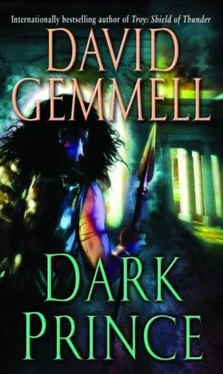'Nor should you,' said the King. 'I saw it in a vision: his heart burst like an over-ripe melon.'
Alexander walked to the window and stood staring out over the sea.
Hephaistion moved to his side, speaking so softly that Parmenion could not make out the words. But Alexander nodded.
'The King wishes now to be alone,' Hephaistion stated.
Parmenion rose and gathered his helm, but Alexander remained at the window. Baffled, the Spartan followed Craterus from the room.
'Is the King well?' he asked the younger man as they walked out into the sunlight.
Craterus paused before replying. 'Last night he told me he was about to become a god. He was not joking, Parmenion. But then later, when I asked him about it, he denied ever saying it. He has been so… fey of late. Visions, talks with the gods. You have great experience, sir, of men and battles and long campaigns. Do you understand what is happening to him?'
'Have you spoken of this to anyone?'
'No, sir. Of course not.'
'That is wise, my boy. Say nothing — not to Hephaistion, nor any of your friends. Even if others discuss it in your presence, stay silent.'
Craterus' eyes widened. 'You think he is going insane?'
'No!' replied Parmenion, more forcefully than he intended. 'He has genuine powers. He had them as a child: the ability to see events a great distance away, and other. . Talents. Now they have returned. But they create in him terrible pressures.'
'What do you advise?'
'I have no more advice to offer. He is marked for greatness. All we can do is support him and follow him. He is strong-willed and I hope this. . malaise. . will pass.'
'But you do not think it will?'
Parmenion did not reply. Patting the young man's shoulder the Spartan walked away, his thoughts sombre. For too long he had pushed away the doubts, turned his eyes from the truth. Mothac had been right, he had blinded himself to the obvious.
The strategos had allowed emotion to mask intellect, had even dulled his reason with wine. How many times had he warned his junior officers of just such stupidity? But now he was forced to face, head on, the fear he had lived with for so long.
The Chaos Spirit had returned.
Battle at the Issus, 333 BC
The morning was chill as Parmenion, in full battle armour, rode the grey, Paxus, towards the north, and steam billowed from the stallion's nostrils. The sky was the colour of iron and a sea-mist had crept in from the west, seeping across the camp-site, dulling the sounds as the Macedonian infantry moved into formation. Parmenion tied the chinstraps on his helm and swung to watch the gathering men.
For five days the Macedonians had marched south, apparently fleeing before Darius' vast army, but now — as the dawn light bathed the Mediterranean — the Greeks swung back to the north, marching through a narrow rock-strewn pass.
With the Persian camp less than four miles distant, Parmenion rode warily at the head of the Macedonian infantry with Alexander alongside him. Throughout the night the Spartan had listened to reports from the scouts concerning the Persian positions. Believing Alexander to be fleeing from him, Darius — as Parmenion had hoped — had become careless. His vast forces numbering more than 200,000 were camped by a river south of the town of Issus, and it was here that Parmenion intended to force the battle; for the flatlands south of the town extended for only a mile and a half, and it would be difficult for the Persians to use their numerical advantage to envelop the Macedonian flanks.
Alexander was unnaturally quiet as they rode, and none of the officers felt inclined to break the silence.
This was the moment of truth and every man, marching or riding, peasant or noble, knew it. It was not even the question of victory or defeat- save in the minds of the generals and captains. Today would see each man face the prospect of death or mutilation. News had spread of the size of the force opposing them and Alexander had toured the camp — talking to the men, exhorting them, lifting them. But even such charismatic encouragement seemed thin and as wispy as the mist on this cold morning.
The land ahead widened, the hills to the east flattening and the mountains receding behind them, and Alexander ordered the infantry to fan out on to the plain. Led by the silver-bearded Theoparlis, the Shield Bearers — elite foot-soldiers trained by Parmenion — moved out to the right, leaving the Macedonian infantry under Perdiccas in the centre. Allied soldiers and mercenaries remained on the left and the advance continued on a wide front, the men marching now in ranks eight deep.
Alexander and his officers rode along the line to the west where the allied cavalry and Thessalians fanned out from the centre like the wings of an eagle.
At last Alexander spoke, guiding Bucephalus alongside Parmenion's mount. 'Well, my general, the day is finally here.' He grinned and reached out to clasp Parmenion's hand in the warrior's grip, wrist to wrist. 'We will meet again in victory — or in the Elysian Fields.'
'Victory would be preferable,' answered Parmenion, with a wry smile.
'Then let it be so!' agreed the King, tugging on the reins and galloping to the far right, his Companion cavalry and Lancers streaming behind him.
Parmenion rode back to the column of lightly-armoured archers, marching behind the phalanxes. The men were Agrianians from Western Thrace, tall and wolf-like, mountain men carrying short, curved hunting bows of bonded wood. The archers were fine fighters — calm, unflappable and deadly in battle. Calling their officer to him, Parmenion ordered the bowmen to angle their march to the right into the mist-clad foothills.
'Darius will almost certainly send cavalry to outflank us. Harry them. Turn them back if you can. If you cannot, then make sure they suffer great losses.'
'Yes, sir,' answered the man. 'We'll send them running.' He gave a gap-toothed grin and loped off towards the east, his men filing out behind him.
The Spartan rode back to the cavalry on the left, his eyes scanning the long line of flat beach to the west. He swung to Berin, the hawk-faced Thessalian prince who had fought beside him at the Crocus Field so many years before.
Berin was grey-bearded now, but still lean and strong, his face tanned to the colour of old leather. The Thessalian smiled. 'They may try to attack on the flat by the sea,' he said. 'You want us to ride out there?'
'No. Take your men behind the infantry and dismount. I do not want you seen until the enemy are committed to a flank attack.'
Berin gave a casual salute and led his men back along the line. Dust was rising now behind the marching men and the Thessalians dismounted and hung back, protecting the delicate nostrils of their mounts. Some even spilled precious water on to dry cloths, wiping dust from the mouths of their horses.
The army moved on. In the distance the Persian defences came into sight, across a narrow ribbon of a river where earthworks had been hastily thrown up, pitted with stakes.
Brightly-garbed Persian cavalry could be seen moving through the foothills on the right, but Parmenion forced himself to ignore them, trusting to the skills of the Agrianian archers to contain them. Slowly the advance continued, Parmenion angling the 2,000 allied cavalry further to the left and ordering the men to spread out.
As he had hoped, a large force of Persian horsemen forded the river, heading west towards the beach. His trained eye watched them streaming out from the enemy right, three thousand, four, five, six. .
Ptolemy moved alongside Parmenion. 'Can we hold them?' asked the young man nervously. The Spartan nodded.
'Order Berin and his Thessalians to mount.'
Parmenion swung his gaze back to the centre, where the Macedonian infantry were almost at the river. Now was the testing time, for there was no way the men could cross the water and maintain formation. And they faced a solid mass of well-armed and armoured Persian Guards and at least 5,000 renegade Greek mercenaries, many from Boeotia and Thebes, men with deep hatred for the Macedonian conquerors.
Читать дальше












